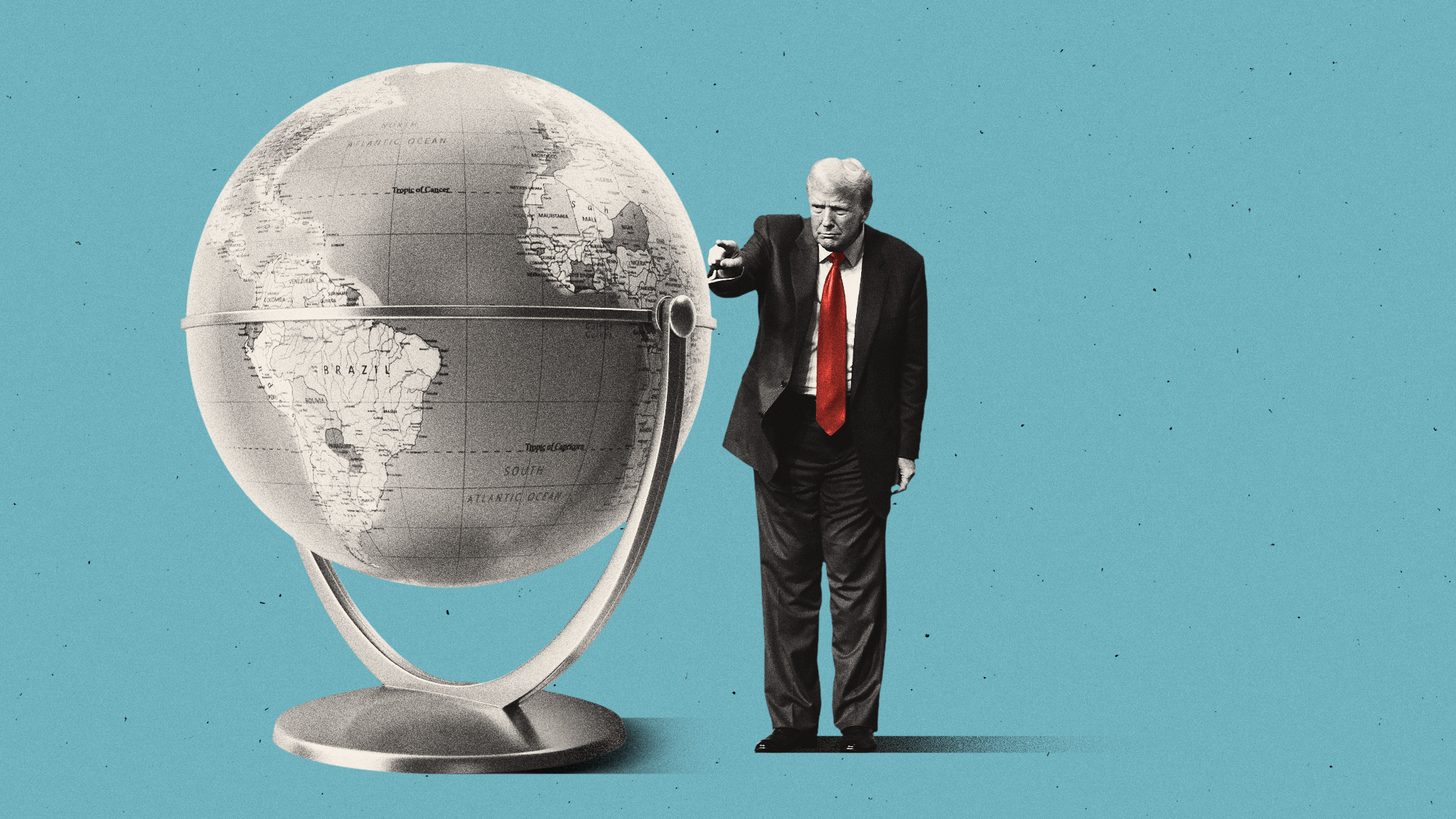Why do pro-life conservatives support anti-immigrant groups pushing population control?
There is a strange hypocrisy at the heart of the conservative movement


America's anti-immigration restrictionist movement has historically had one foot in the labor protectionist camp and another in the population control camp. Many pro-life conservatives count themselves among immigration restrictionists — which makes the anti-immigration movement's population control argument downright bizarre, given that population control and abortion politics have been a key flashpoint in conservatives' broader culture war with the left.
But even as the environmental left has been shunning the restrictionist movement, conservatives have been embracing it. Indeed, the right is the sole link to mainstream respectability for three of America's most influential restrictionist groups — FAIR (Federation for American Immigration Reform), CIS (Center for Immigration Studies), and NumbersUSA — all founded by John Tanton, an ophthalmologist who laments that Hitler gave eugenics a bad name.
Let's back up for a moment. In the 1970s, all the leading environmentalists — such as economist Garrett Hardin, Democratic Sen. Gaylord Nelson, biologist Paul Ehrlich (whose Population Bomb became an overnight sensation) — were also restrictionists. They feared that "mass migration," especially from third world countries with higher fertility rates, would lead to overpopulation and environmental catastrophe in America and the West.
The Week
Escape your echo chamber. Get the facts behind the news, plus analysis from multiple perspectives.

Sign up for The Week's Free Newsletters
From our morning news briefing to a weekly Good News Newsletter, get the best of The Week delivered directly to your inbox.
From our morning news briefing to a weekly Good News Newsletter, get the best of The Week delivered directly to your inbox.
Such fears turned out to be entirely bogus. Indeed, the West's demographic problem isn't a fertility explosion but a fertility implosion. To its credit, the environmental movement has steadily distanced itself from its restrictionist allies, refusing to acquiesce to demands that environmentalists include immigration control in their agenda.
But pro-life conservatives seem to be suffering from no equivalent qualms — even though the underlying agenda of the big three restrictionist groups arguably violates core pro-life principles.
It's not like these outfits are subtle about their true intentions. Tanton, their founder, is clear in saying his restrictionism is part of a broader population control program that also involves abortion, family planning, and other efforts to decrease fertility. He served on the board of his local Planned Parenthood chapter and as president of Zero Population Growth. His anti-Catholic sentiments are well known, given Catholicism's religious objections to population control. He has warned incessantly about the "Latin onslaught" — the threat that the multiplying Latino population poses to the existing Anglo-Saxon power structure — once musing whether this was the first time in history when "those with their pants up are going to get caught by those with their pants down."
Tanton isn't worried simply about the number of humans, but also their quality. Under his leadership, FAIR accepted $1.2 million from the Pioneer Fund, a white nationalist organization that favors eugenics for "race betterment." While social conservatives worry that modern medicine will trigger an unnatural quest for perfect, designer babies, Tanton's concern is that it will lead to the "eroding of the gene pool" by letting less intelligent people procreate faster than more intelligent ones.
A free daily email with the biggest news stories of the day – and the best features from TheWeek.com
None of this is particularly new — Tanton has been covered extensively over the years. But it was only a 2011 New York Times expose about Tanton that finally forced him off of FAIR's board. His views, however, have lived on in the organizations he helped fund.
Dan Stein, Tanton's successor at FAIR, has stuck to the view that only "intelligent people" should be encouraged to breed. He has defended China's disastrous one-child policy as just an "international family planning program." FAIR also opposes asylum for Chinese moms facing forced abortions, believing that China has "one of the most humane and rational policies in the world."
While FAIR is perhaps the ickiest of the restrictionist trio, they're all quite bad. NumbersUSA president Roy Beck, who Tanton has blessed as his "heir apparent," blames population pressures due to "mass" immigration for practically every economic and environmental ill in America, real or imagined (but mostly imagined). His basic point, illustrated through dramatic videos, is simple: Population growth plus finite resources equals congestion, pollution, sprawl, depleted fresh water supplies, and loss of open spaces and wilderness.
This make good sense, except for the inconvenient truth that America's period of "mass" immigration — which in his telling started after 1965 when Congress scrapped three decades of the "golden age" of racist national quotas — has coincided with stunning environmental gains. During that period in America, water and air quality improved dramatically, forest cover increased, and the area devoted to cropland decreased even as food production boomed, much of which Cato Institute's Indur Gokhlany has richly documented.
Clearly, the relationship between immigration-led population growth and pollution is more complicated than the simple, direct correlation that Beck and his restrictionist cronies claim. Indeed, the only reliable predictor of national environmental improvement is wealth — whose generation, the vast majority of economists agree, immigrants greatly aid. That's because immigrants are not simply mouths to feed — but hands and brains to spur economic growth.
And that brings us to the third major restriction group: the Center for Immigration Studies (CIS), which Tanton spun off when he found himself losing the "battle of ideas." CIS's express charge was to promote restrictionism on more acceptable intellectual grounds. This move paid off when the conservative National Review, a perennial immigration opponent, gave CIS executive director Mark Krikorian (whom I have debated) along with many of his colleagues and researchers — including Jason Richwine, whose dissertation recommending IQ tests for immigrants and musings at white nationalist websites forced him to resign from the Heritage Foundation — a regular blogging platform.
Krikorian, like Beck, cut his restrictionist teeth at FAIR when he wrote for its newsletter in the 1980s. Subsequently, he attended FAIR's writers workshops while heading CIS. Although he has been careful to primarily stick to making an economic and cultural case against immigration in National Review, Mario Lopez pointed out in Human Life Review that "the same [FAIR] environmentalist, abortion, and population-control ideology permeates CIS, its funders, and founders." Human Life Review is not some progressive, lefty, PC outfit looking to demonize conservatives. It is a conservative Catholic publication founded by a former associate publisher of National Review.
National Review fiercely disputes Lopez's argument, claiming that CIS and NumbersUSA "very deliberately take no position on abortion and population control," although its members might. But that's not quite right. CIS openly espouses population control — including "curtailing needless restrictions on abortion" — and has posted papers (authored by Roy Beck) lambasting environmentalists for "forsaking" their previous commitment to it.
Let's be clear about what is happening here: National Review, perhaps the country's leading journal for intellectual conservatives, and a magazine with strong pro-life leanings, has lent its name and platform to the leader of an organization that clearly favors population control.
National Review's stamp has no doubt helped CIS and its sister outfits lobby conservatives on Capitol Hill. Lopez notes that many pro-life Republican congressmen, such as Rep. Steve King of Iowa and former Rep. Todd Tiahrt of Kansas, have worked with FAIR and/or NumbersUSA to craft immigration-related legislation — as have other pro-life think tanks and advocacy groups. Likewise, Sen. Jeff Sessions of Alabama, an arch-pro lifer, is a close ally of all three of these restrictionist outfits. "This represents such a stark dichotomy that one must, at a minimum, question whether any due diligence was done at all," notes Lopez.
Reasonable people can disagree about immigration policy. I am strongly in favor of letting more people in, but there is a case to be made for cutting back. However, if the conservative movement dilutes its other core commitments to make questionable alliances in order to push its anti-immigration agenda, it'll only lose credibility over the long run. In the war on immigration, not all is fair.
Shikha Dalmia is a visiting fellow at the Mercatus Center at George Mason University studying the rise of populist authoritarianism. She is a Bloomberg View contributor and a columnist at the Washington Examiner, and she also writes regularly for The New York Times, USA Today, The Wall Street Journal, and numerous other publications. She considers herself to be a progressive libertarian and an agnostic with Buddhist longings and a Sufi soul.
-
 Magazine printables - Nov. 21, 2025
Magazine printables - Nov. 21, 2025Puzzle and Quizzes Magazine printables - Nov. 21, 2025
-
 The diminishing power of willpower
The diminishing power of willpowerIn the Spotlight ‘Try harder’ attitude may not be the best way to achieve long-term goals
-
 Greenland, Colombia, Cuba: where is Donald Trump eyeing up next?
Greenland, Colombia, Cuba: where is Donald Trump eyeing up next?Today's Big Question Ousting Venezuela’s leader could embolden the US administration to exert its dominance elsewhere
-
 Bari Weiss’ ‘60 Minutes’ scandal is about more than one report
Bari Weiss’ ‘60 Minutes’ scandal is about more than one reportIN THE SPOTLIGHT By blocking an approved segment on a controversial prison holding US deportees in El Salvador, the editor-in-chief of CBS News has become the main story
-
 Has Zohran Mamdani shown the Democrats how to win again?
Has Zohran Mamdani shown the Democrats how to win again?Today’s Big Question New York City mayoral election touted as victory for left-wing populists but moderate centrist wins elsewhere present more complex path for Democratic Party
-
 Millions turn out for anti-Trump ‘No Kings’ rallies
Millions turn out for anti-Trump ‘No Kings’ ralliesSpeed Read An estimated 7 million people participated, 2 million more than at the first ‘No Kings’ protest in June
-
 Ghislaine Maxwell: angling for a Trump pardon
Ghislaine Maxwell: angling for a Trump pardonTalking Point Convicted sex trafficker's testimony could shed new light on president's links to Jeffrey Epstein
-
 The last words and final moments of 40 presidents
The last words and final moments of 40 presidentsThe Explainer Some are eloquent quotes worthy of the holders of the highest office in the nation, and others... aren't
-
 The JFK files: the truth at last?
The JFK files: the truth at last?In The Spotlight More than 64,000 previously classified documents relating the 1963 assassination of John F. Kennedy have been released by the Trump administration
-
 'Seriously, not literally': how should the world take Donald Trump?
'Seriously, not literally': how should the world take Donald Trump?Today's big question White House rhetoric and reality look likely to become increasingly blurred
-
 Will Trump's 'madman' strategy pay off?
Will Trump's 'madman' strategy pay off?Today's Big Question Incoming US president likes to seem unpredictable but, this time round, world leaders could be wise to his playbook
